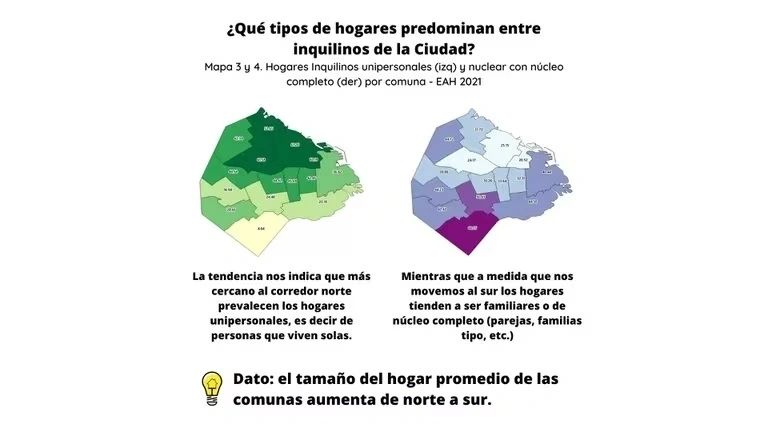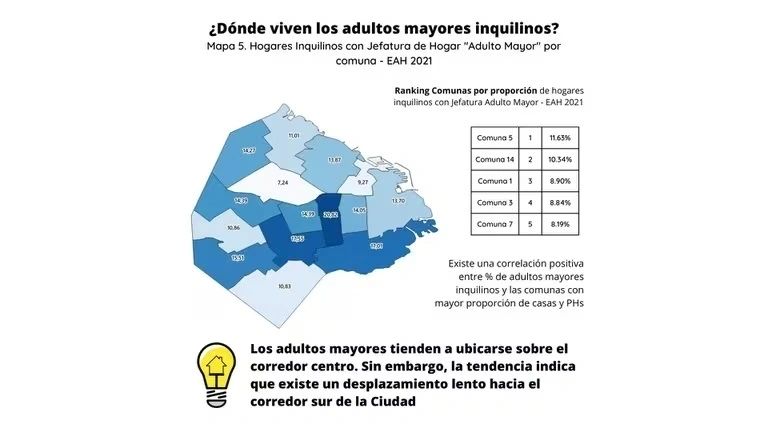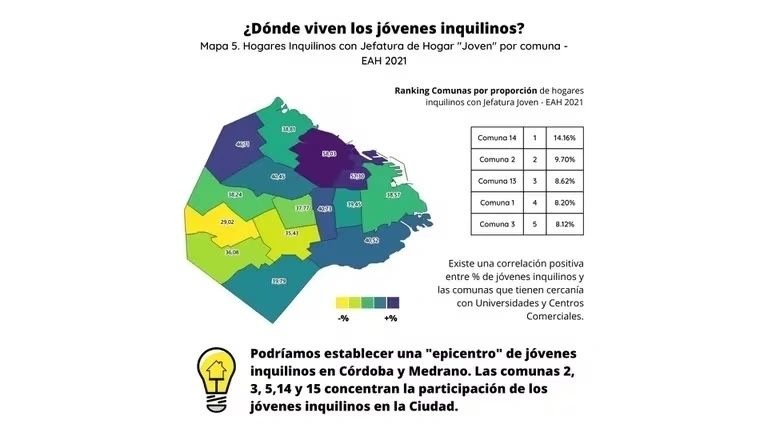BuySellBA
Administrator
The drama of renting: In CABA, almost 80% of young people must terminate their contracts because they cannot pay them - Infobae

Source:

El drama de alquilar: en CABA, casi el 80% de los jóvenes debe rescindir sus contratos porque no pueden pagarlos
El Gobierno recién asumido habla de quitar regulaciones y de derogar la polémica ley, pero desde el sector aseguran que los problemas siguen siendo la falta de crédito hipotecario y la inflación
The newly inaugurated Government talks about removing regulations and repealing the controversial law, but from the sector they assure that the problems continue to be the lack of mortgage credit and inflation
By José Luis Cieri

In 2000, about 75% of the inhabitants were owners; Today, only 52% own the home they live in (Illustrative Image Infobae)
Housing rentals in Argentina are going through an unprecedented crisis, record increases month after month and a shortage of units in pesos in all neighborhoods and cities.
At a time when once again the controversial Rental Law of 2020 is once again at the center of the debate, a report revealed that in the city of Buenos Aires 76% of young people under 35 years of age do not fulfill their contract and They have to terminate them before they expire.
This harsh reality occurs in a context in which the new Government of Javier Milei would be considering a project to repeal it, seeking to restore freedom in the agreements between the parties, governed by the Civil and Commercial Code of the Nation of 2015, as It was before current legislation.
Through a recent comparative analysis through census data, the Tejido Urbano Foundation found a large drop in the number of homeowners in CABA. In 2000, for example, about 75% of the inhabitants were owners; Today, only 52% own the home they live in.
In CABA, 40% of rents are made by single people, which makes it difficult to pay them in an inflationary scenario and loss of real salary.
“Another figure also stands out that shows the economic precariousness of the youngest people who seek to become independent. 76% (a data obtained in conjunction with the Argentine Real Estate Chamber) of those under 35 years of age do not complete the rental contract. Many return to live with their parents or cohabit with other people to be able to cover expenses and pay the rent,” said Fernando Álvarez de Celis, executive director of Tejido Urbano.
The situation is very complex. Some tenants are forced to start searching for a new apartment several months in advance, either because their contract is about to expire or because they cannot afford the monthly payments. Sometimes they face abusive conditions from the owners , such as unjustified increases, something illegal. As a result, many are forced to abandon the property and, in some cases, to move from CABA to Greater Buenos Aires or to another city in the province.

Fernando Álvarez de Celis, executive director of Fundación Tejido Urbano
A studio apartment in the Almagro neighborhood costs no less than $180,000 per month for those who manage to finalize a contract. As for a two-room apartment, the most affordable value in Palermo reaches $210,000 per month.
A 3-room apartment in Caballito costs about $310,000 per month, a real economic challenge for employees.
Informality always present
Experts maintain that the underlying problem is the lack of housing and that repealing current regulations alone would not be enough.Álvarez de Celis added: “Although the rental market has historically been characterized by informality, where the parties negotiate the contract, this temporary measure must be accompanied by structural policies that make it possible to resolve the structural housing deficit.”

Source: Urban Fabric Foundation
The statistical data reflect a strong tenancy process, which is deepening in the northern Buenos Aires rental axis, which has a higher percentage of tenants than owners.
About 55% of the City's population rents in the northern axis (in neighborhoods such as Belgrano, Colegiales, Villa Urquiza, Saavedra, among others, where two-room apartments today do not go below $200,000 a month), this goes from hand in hand with an increase in the number of young single-family homes.
In parallel, the report from the Tejido Urbano Foundation revealed that a “displacement phenomenon” occurs, where older adults must rent a home, something that was not seen in the results of the previous Census and now it is common to observe this situation in the southern axis of CABA.
“This happens because there is less rental supply and people who have fewer resources go to the southern axis (in neighborhoods like Barracas). Larger families and a large part of the elderly live there,” added Álvarez de Celis.

The youngest and the oldest adults are the most affected in this process of tenancy who, due to the lack of access to their own home, are pushed into overcrowding, causing a social setback in terms of quality of life.
“In general terms, older adults are mostly owners, however in the last Census it can be seen that the percentage that rents increases considerably. These people have less purchasing power and look for less valued areas of the market, which is why in proportion there are more in the central and southern areas than in the north,” Álvarez de Celis clarified.
How to get out of this situation
This tenancy process occurs throughout Argentina, with special emphasis in CABA. The lack of mortgage credit and the increase in dollar value of a home make it increasingly difficult to acquire a property.Álvarez de Celis expanded: “Some 120,000 homes were built in the last 12 years (intercensal measurement) of which a large percentage are intended as a reserve of value and in many cases end up destined for rental.”

Source: Urban Fabric Foundation
The “high income” axis is the north of the city. Where more properties are built and not as a first home, but as a store of value. There the percentage of renters increases over that of owners.
Regarding how to overcome the lack of supply and what should be done to change the situation of tenants, Álvarez de Celis concluded by saying that “in the country there is a deficit of 1 million homes. As long as these units continue to be missing, it will be very difficult to solve the rental problem. Regulation has a partial impact, there should be more mechanisms that promote the construction of housing and mortgage loans reappear.”
www.buysellba.com

